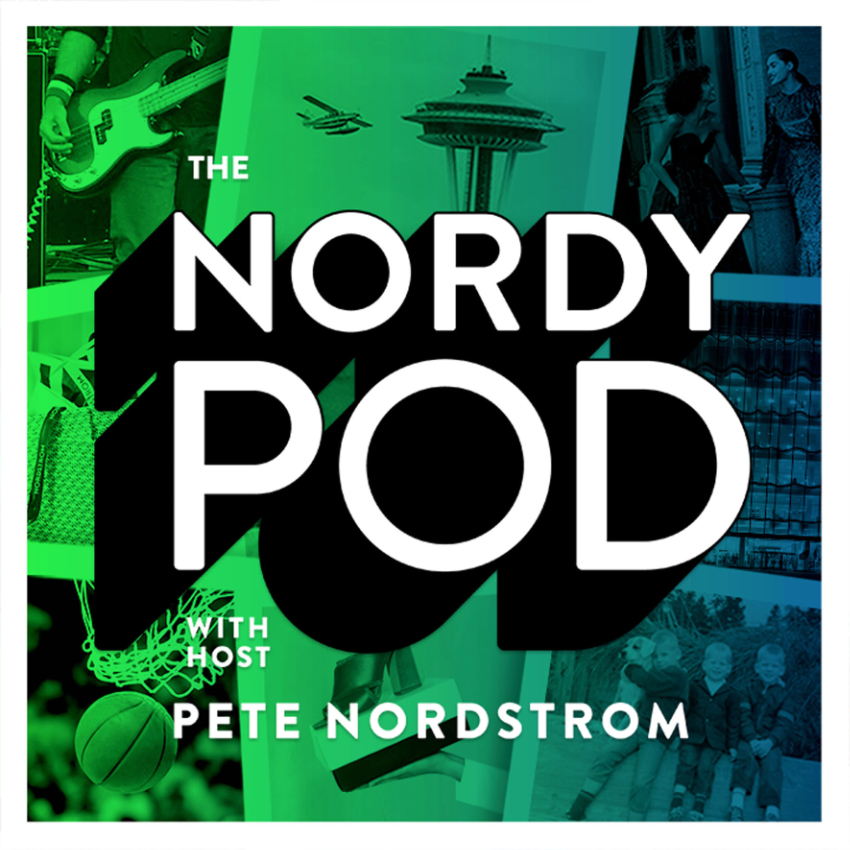Earlier this year, Pete Nordstrom, president and chief brand officer of the retailer that bears his family name, launched Nordy Pod, a podcast or as he said, he added a new title to his resume. During the hour-long presentation, he invites employees or members of the extended Nordstrom family,” including friends of the company and actual blood relatives, for unscripted chats.
As is characteristic of exceptional retailers, Pete is truly interested in people and his authentic curiosity shows in his conversations. His guests over the course of the 14 episodes, available online, have included longtime friend and sometime competitor Mickey Drexler, actor Jessica Alba, Bonobos’ Andy Dunn, and Levi’s Chip Bergh, among others.
Nordy Pod is a departure from the marketing-focused presentations one would expect from a retail brand. It harkens back to the days of great merchants like Stanley Marcus, who was famous for greeting customers at the door every morning. Pete is reviving that personal touch by opening the virtual door for his customers, team members, and outsider fanbase, like me, to learn what makes him and his business tick.
The Nordstrom tire story is not supernatural, but it does have a spiritual element. It communicates the spirit of the Nordstrom brand and company.
The latest episode is devoted to the company’s apocryphal tire story, the one where Nordstrom honored its no-questions-asked guarantee by providing a refund for a pair of tires, even though the company never sold tires.
The Tire Story Is True
“Almost everywhere I go, this story follows us around, and someone says ‘There’s no way that’s true. You guys have perpetuated this myth as a metaphor to talk about your service culture. And I say, ‘No, it’s actually true,’” Pete related.
Pete’s guest on the latest podcast was Craig Trounce, the associate who handled the transaction some 40 years ago in Fairbanks, Alaska. “We are known for our policy that we take everything back. It boils down to the customer and how we take care of them, which is ingrained in our culture,” Pete explained.
As Trounce explained it, the actual return transaction isn’t quite as unbelievable as its first hearing. In 1975 Nordstrom bought a local Alaska general merchandise retailer that originally sold the man the tires with a full guarantee that he could return them if they didn’t work out. So, after a couple of years after not using them, he brought the tires back to the place where he made his purchase only to discover that the name on the door had changed.
Describing the gentleman as a feisty, backwoods “hermit” type of character who made a 50-mile trek to make his return, Trounce leaned into his training. Everything the man told him rang true, so he felt compelled to do the right thing, despite not selling the man the tires in the first place. But Nordstrom took over the building where the original purchase and guarantee promise was made so Trounce recognized the obligation.
With his supervisor watching the interchange from the backroom and effectively giving him thumbs-up, Trounce called the local Firestone dealer to find out what the tires were worth – about $25 per time at the time – and refunded the money. “I was congratulated from my manager who realized I had the situation under control and did the right thing,” Trounce recalled.
Trounce has gone on to manage Alaska Airline’s guest care services center and his early customer-service learning at Nordstrom has gone along with him. “I always hold my hand over my heart and tell folks, “If you are listening to what you’re feeling right here, that is the right direction to go to take care of your customer,” he shared. “You have to trust your instincts. You have to trust the customer and you have to listen, then you’ll discover the right thing to do.”
In thanking Trounce for sharing his story, Pete reflected, “I can’t tell you how many people have talked about the tire story and how big of an impact it’s had in strengthening our whole service culture. Even though it’s the most famous story we have, it is really just one drop in a sea of exceptional service stories I hear about our employees on a regular basis.”
Empower Your People
Also joining Pete in the podcast was Robert Spector, author of The Nordstrom Way and its subsequent editions. Spector has basically made a lifelong career telling the Nordstrom tire story and using that as a model to teach other companies how to build a corporate customer service culture.
“I‘ve spoken about Nordstrom for many years in 27 countries and most of the audiences have been in financial services, healthcare, real estate and even manufacturing companies. People who’ve never set foot in a Nordstrom store know Nordstrom for its customer-service reputation,” he said and continued, “Nordstrom doesn’t advertise it [the tire story] and doesn’t publicize it, but everybody knows it—it’s 100 percent word of mouth, the most powerful advertising there is.”
He uses Nordstrom and the tire story as a metaphor—“I write and talk about Nordstrom not as an example of how to sell shoes. It’s an example of how to create a customer-first corporate culture.” It starts with empowering the workforce. “You have to empower everyone in the company, frontline people, and support people, to allow them to go above and beyond to solve customer problems. You have to empower them to use their best judgment,” he shares. “And the way to extend and develop that culture is through storytelling.”
Pete then asks if storytelling still is relevant in our digital age and Spector’s answer is that it is even more important today. “Digital must be made as personal as possible,” Spector related. “We are social animals and people want to be in the marketplace. Pure-play internet companies are opening stores because nothing beats the physical connection. You have to keep that personal connection and it’s a real challenge. But retail is still a people business, and I don’t think that will ever change.”
To that end, the Nordstrom leadership team stresses that the company is actually in the customer service business, rather than just selling stuff. Spector then shared another story about an amputee who asked to buy just one shoe, not a pair.“ So, they made a $350 sale rather than a $700 sale. What was that worth in advertising, good will, customer loyalty? Much more than the $350 lost in the sale,” he said.
“We are social beings,” Spector continued. “It’s not just the exchange of money for goods and services. It’s creating that personal relationship with the customer. The best definition of retail I ever heard was where the economic order and social order meet.”
The tire story has lived on not just as a legacy for Nordstrom customers and potential customers. It has been the most powerful way possible to telegraph the Nordstrom culture across its nearly 70,000 members. “The tire story is the best single vehicle to pass on the Nordstrom culture and our service ethic. It means people are allowed to use good judgment and always do the right thing,” Pete observed.
Power of Brand Myths
It’s safe to say that Nordstrom’s tire story is the most well-known myth in retail, if not in all of business. Myths go back to the dawn of time and are the primary vehicle through which a culture’s worldview is transmitted, according to the Merriam-Webster dictionary. So, we have Greek mythology, the Norse gods, the Mayans, and the Native American origin myths. Myths are also used to explain a practice, belief system or natural phenomenon and often have a supernatural, spiritual aspect. So, every culture has an origin myth.
The Nordstrom tire story is not supernatural – it actually happened – but it does have a spiritual element. It communicates the spirit of the Nordstrom brand and company. Or as Seth Godin explained when reflecting on the power of a brand myth. “The key word is spiritual. Mythological brands make a spiritual connection with the user, delivering something that we can’t find on our own…or at the very least, giving us a slate we can use to write our own spirituality on. People use a Dell. They are an Apple.”
The Nordstrom tire story is powerful because it retells the Golden Rule – “Do unto others as you would have them do unto you,” a mythic values-laden story for all time and all peoples.




